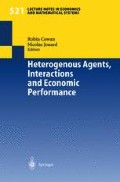Abstract
We present a model of opinion dynamics in which agents adjust continuous opinions as a result of random binary encounters whenever their difference in opinion is below a given threshold. High thresholds yield convergence of opinions towards an average opinion, whereas low thresholds result in several opinion clusters. The model is further generalised to threshold heterogeneity, adaptive thresholds and binary strings of opinions.
Access this chapter
Tax calculation will be finalised at checkout
Purchases are for personal use only
Preview
Unable to display preview. Download preview PDF.
References
Arthur, B. W. (1994) Increasing Returns and Path Dependence in the Economy. University of Michigan Press, Ann Arbor, MI
Axelrod R. (1997) Disseminating cultures. In The Complexity of Cooperation, Axelrod, R., 145–177, Princeton University Press
Chatterjee S. and Seneta E., (1977) Towards consensus: some convergence theorems on repeated averaging. J. Appl. Prob., 14:89–97
Cohen J. E., Hajnal J. and Newman C.M. (1986) Approaching consensus can be delicate when positions harden. Stochastic Processes and their Applications, 22:315–322
5. G. Deffuant, D. Neau, F. Amblard and G. Weisbuch (2000) Mixing beliefs among interacting agents. Advances in Complex Systems, 3:87–98
Föllmer H. (1974) Random Economies with Many Interacting Agents. Journal of Mathematical Economics, 1:51–62
Galam S., Y. Gefen and Shapir Y., (1982) Sociophysics: A mean behavior model for the process of strike. Math. Journal of Sociology, 9:1–13
Galam S. and Moscovici S., (1991) Towards a theory of collective phenomena: consensus and attitude changes in groups. European Journal of Social Psychology, 21:49–74
9. Hegselmann R. and Krause U. (2002) Opinion formation under bounded confidence. Proceedings of the Simsoc5 conference, to appear in Journal of Artificial Societies and Social Simulation
Henrich J., Boyd R., Bowles S., Camerer C., Fehr E., Gintis H., and McElreath R. (2001) In Search of Homo Economicus: Behavioral Experiments in 15 Small-Scale Societies, American Economic Review P & P, 91:73–78
Higgs P.G. and Derrida, B. (1991) Stochastic models for species formation in evolving populations. J. Phys. A: Math. Gen., 24:985–991
Krause U. (2000) A discrete non-linear and non-autonomous model of consensus formation. In Communications in Difference Equations, Elaydi et al. (eds.), Gordon and Breach pub.
IMAGES (2001) Improving Agri-Environmental Policies: A Simulation Approach to the Role of the Cognitive Properties of Farmers and Institutions. Web site http://www.lisc.clermont.cemagref.fr/ImagesProject/
Laslier, J.F. (1989) Diffusion d’information et évaluations séquentielles. Economie appliquée, 42:155–170
Latané, B. and Nowak, A. (1997) Self-Organizing Social Systems: Necessary and Sufficient Conditions for the Emergence of Clustering, Consolidation and Continuing Diversity. In Progress in Communication Sciences, Barnett, G. A. and Boster, F. J. (eds.), 43–74
Neau, D (2000) Révisions des croyances dans un système d’agents en interaction. Rapport d’option de l’école polytechnique, available at http://www.lps.ens.fr/~weisbuch/rapneau.ps
Orléan A. (1995) Bayesian Interactions and Collective Dynamics of Opinions: Herd Behavior and Mimetic Contagion. Journal of Economic Behavior and Organization, 28:257–274
Stone M. (1961) The opinion Pool. Ann. of Math. Stat., 32:1339–1342
Weisbuch G. and Boudjema G. (1999) Dynamical aspects in the Adoption of Agri-Environmental Measures. Adv. Complex Systems, 2:11–36
Weisbuch G., Deffuant D., Amblard F. and Nadal J.P. (2001) Interacting Agents and Continuous Opinions Dynamics. Cond-mat/0111494, available at xxx.lanl.gov, and Santa Fe Institute Working Paper 01-11-072
Young H. P., and Burke M. A. (2000) Competition and Custom in Economic Contracts: A Case Study of Illinois Agriculture. Am. Econ. Rev., 91:559–573
Author information
Authors and Affiliations
Editor information
Editors and Affiliations
Rights and permissions
Copyright information
© 2003 Springer-Verlag Berlin Heidelberg
About this paper
Cite this paper
Weisbuch, G., Deffuant, G., Amblard, F., Nadal, JP. (2003). Interacting Agents and Continuous Opinions Dynamics. In: Cowan, R., Jonard, N. (eds) Heterogenous Agents, Interactions and Economic Performance. Lecture Notes in Economics and Mathematical Systems, vol 521. Springer, Berlin, Heidelberg. https://doi.org/10.1007/978-3-642-55651-7_14
Download citation
DOI: https://doi.org/10.1007/978-3-642-55651-7_14
Publisher Name: Springer, Berlin, Heidelberg
Print ISBN: 978-3-540-44057-4
Online ISBN: 978-3-642-55651-7
eBook Packages: Springer Book Archive

